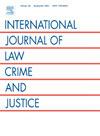Employability Perceptions: does a reference from probation reduce rejection rates?
IF 1.4
4区 社会学
Q3 CRIMINOLOGY & PENOLOGY
International Journal of Law Crime and Justice
Pub Date : 2025-10-18
DOI:10.1016/j.ijlcj.2025.100785
引用次数: 0
Abstract
Finding and maintaining employment is challenging for those with a prior conviction, especially for those with a sexual offence. This study investigated perceived employability before and after the disclosure of criminal history through a Disclosure and Barring Service (DBS) check, using a mixed-methods design. A total of 226 participants were randomly assigned to one of three DBS conditions, each disclosing a different sexual offence: rape, sexual activity with a child, or possession of indecent images of children. Participants rated candidates on trustworthiness, value, and suitability for employment both before and after the DBS disclosure. To examine the potential mitigating effect of character references, half of the participants in each offence condition received an accompanying probation reference, while the other half did not. All participants were subsequently asked whether they would retain or reject the candidate and to provide reasoning for their decision. As hypothesised, ratings of trustworthiness, value, and suitability significantly declined following the disclosure of the DBS information. However, the inclusion of a probation reference led to reduced rejection rates in the conditions involving sexual activity with a child (by 18 %) and possession of indecent images of children (by 24 %). This mitigating effect was less pronounced in the condition involving rape. These findings highlight the persistent stigma associated with sexual offences in employment contexts and suggest that character references from probation services may partially mitigate negative perceptions, though their effectiveness varies by offence type.
就业能力感知:试用证明是否能降低拒绝率?
对于那些有前科的人来说,寻找和维持工作是一项挑战,尤其是那些有性犯罪前科的人。本研究采用混合方法设计,通过披露和禁止服务(DBS)检查,调查了犯罪记录披露前后的感知就业能力。共有226名参与者被随机分配到三个DBS条件中的一个,每个条件都暴露了不同的性犯罪:强奸,与儿童发生性行为,或拥有儿童的不雅图像。参与者在星展银行信息披露前后对候选人的可信度、价值和就业适用性进行了评分。为了检验品德推荐信的潜在缓解作用,在每种犯罪情况下,一半的参与者都收到了附带的缓刑推荐信,而另一半没有。随后,所有参与者都被问及他们是否会保留或拒绝该候选人,并提供他们决定的理由。正如假设的那样,在星展银行信息披露后,可信度、价值和适用性的评级显著下降。然而,在涉及与儿童发生性行为(18%)和拥有儿童不雅图像(24%)的情况下,纳入缓刑参考导致拒绝率降低。在涉及强奸的情况下,这种缓解效果不那么明显。这些发现强调了在就业环境中与性犯罪相关的持续耻辱,并表明来自缓刑服务的品格推荐可能部分减轻负面看法,尽管其有效性因犯罪类型而异。
本文章由计算机程序翻译,如有差异,请以英文原文为准。
求助全文
约1分钟内获得全文
求助全文
来源期刊
CiteScore
2.70
自引率
0.00%
发文量
25
审稿时长
47 days
期刊介绍:
The International Journal of Law, Crime and Justice is an international and fully peer reviewed journal which welcomes high quality, theoretically informed papers on a wide range of fields linked to criminological research and analysis. It invites submissions relating to: Studies of crime and interpretations of forms and dimensions of criminality; Analyses of criminological debates and contested theoretical frameworks of criminological analysis; Research and analysis of criminal justice and penal policy and practices; Research and analysis of policing policies and policing forms and practices. We particularly welcome submissions relating to more recent and emerging areas of criminological enquiry including cyber-enabled crime, fraud-related crime, terrorism and hate crime.

 求助内容:
求助内容: 应助结果提醒方式:
应助结果提醒方式:


